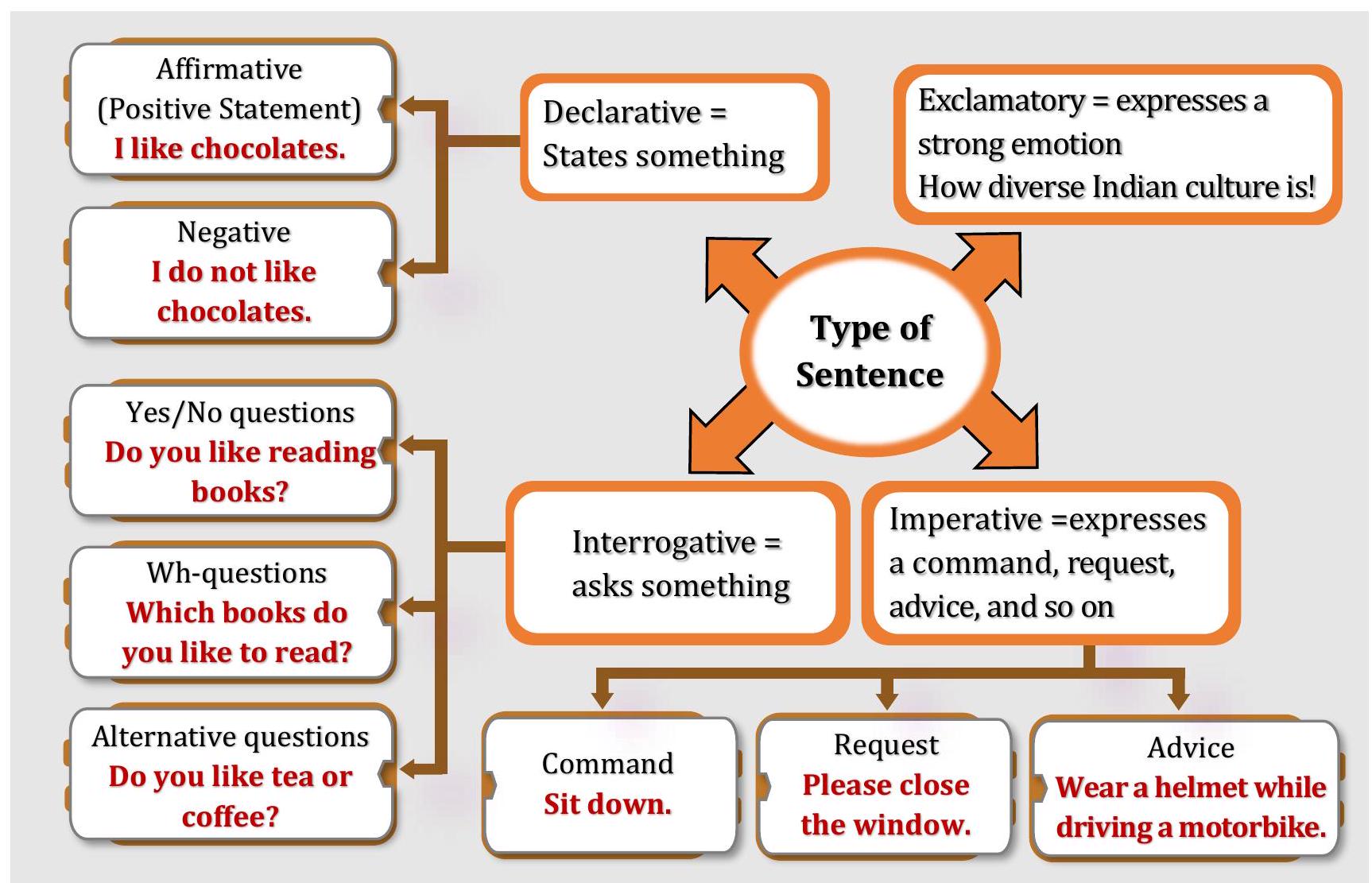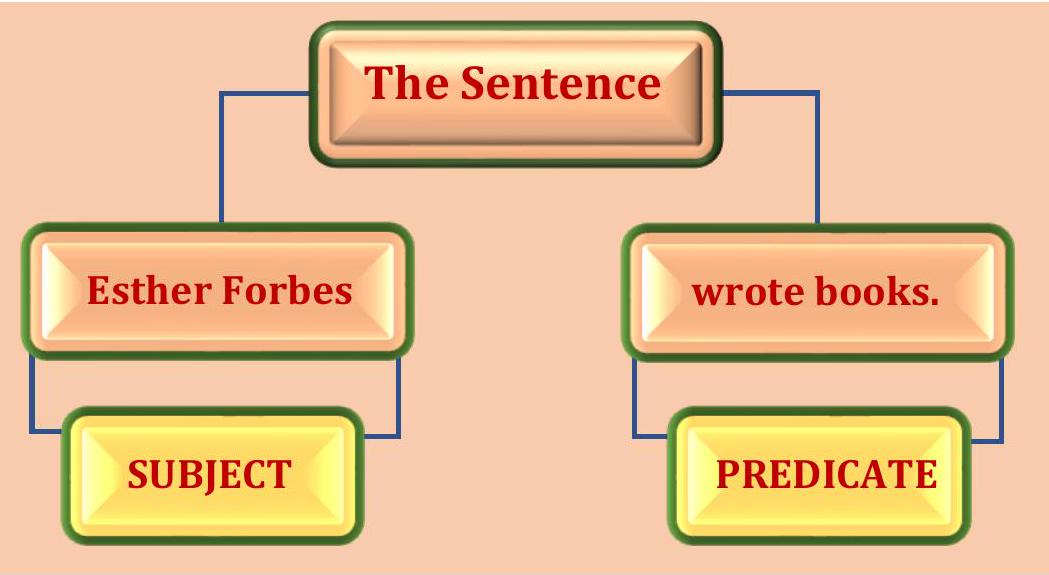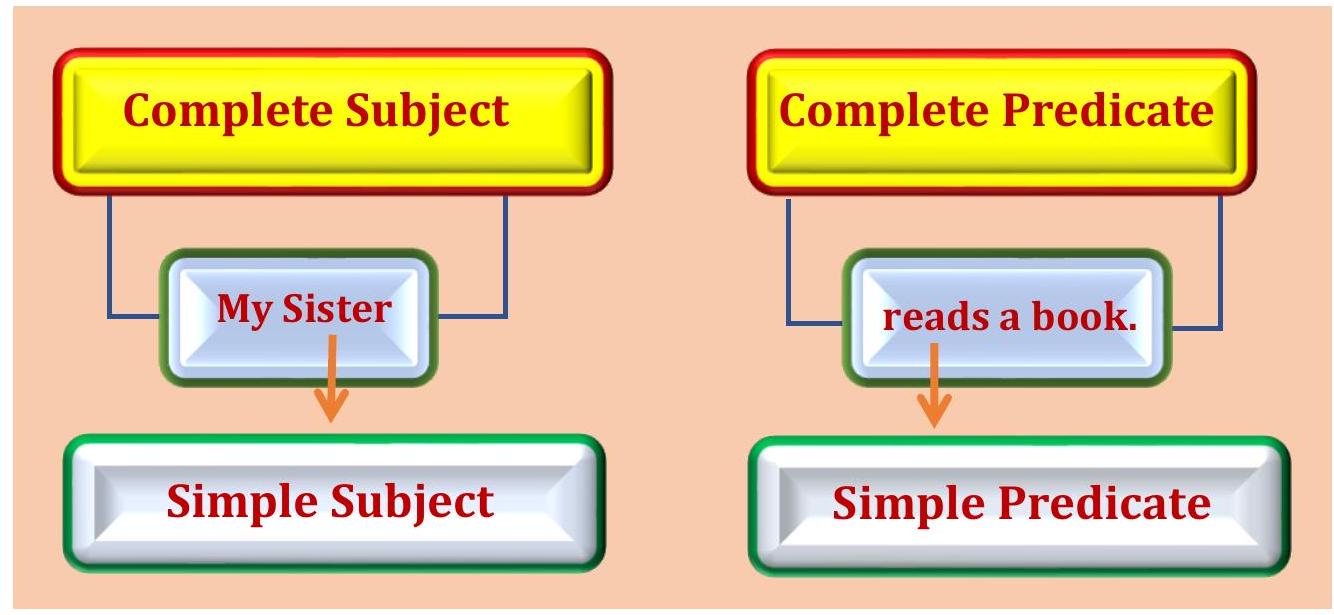The Sentence
1.0Definition
A sentence is a group of words that makes complete sense. Read the following sentences. A. These books. B. I love to read these books.
In both the examples, more than one word is joined together to convey some meaning. The group of words in example 'A' conveys some meaning, but it is not complete in itself. The second group of words in example 'B' conveys a particular meaning and it is complete in itself. It is called a sentence.
2.0Types of Sentences
Different kinds of sentences have different purposes. A sentence can make a statement, ask a question, give a command, or express a strong feeling. Sentences can be of different types. Look at the following diagram.

Declarative Sentences
Sentences that make a statement are known as declarative or assertive sentences. They are of two types-affirmative / positive sentences and negative sentences. Example: The children are playing in the park. (affirmative) The children are not playing in the park. (negative)
Imperative Sentences
Sentences that express a command, request, advice, order, suggestion and so on are known as imperative sentences. Look at the following sentences: A. Bring your homework tomorrow. -> Predicate B. Please give me a glass of water. -> Predicate
Interrogative Sentences
Questions can be divided into three kinds according to the type of reply they expect:

- Yes/No questions expect affirmation or negation. Examples: Is Sonia very ill? Do many rich people evade income tax? Has an Indian athlete won an Olympic medal?
- Wh-questions expect reply from an open range of replies. Examples: Where have you kept the car keys? Why do birds come to India in winter? When will we solve the problem of Kashmir?
- Alternative questions are replied by one of two or more options offered in the questions. Examples: Will he become an engineer or set up a business? Did you go to the playground or watch a film on T.V.? Have you decided to repair the old car or buy a new one?
(D) Exclamatory Sentences
Exclamatory sentences are used to express strong feelings such as surprise, admiration, appreciation and so on.
Formation of Exclamatory Sentences
The following are the two common ways in which exclamatory sentences are constructed: Using 'what' with a Noun What an experience! What a victory! What a beautiful sunset! ('beautiful' is an adjective followed by the noun 'sunset') Using 'how' with an Adjective or an Adverb How absurd all this sounds! How rudely she speaks! How careless you are! Look at the following sentences.
A. The Taj Mahal is an exquisite monument. (declarative) What an exquisite monument(complement) the Taj Mahal(subject) is(verb)! (exclamatory)
B. Amitav Ghosh wrote a great book. (declarative) What a great book Amitav Ghosh wrote! (exclamatory)
Notes:
In the above sentences, the words 'what' and 'how' are used to intensify the expression. In Sentence A, what helps to express a very strong admiration for the Taj Mahal as a beautiful building. In Sentence B, what expresses a strong appreciation of the book that Amitav Ghosh wrote. Some other expressions used in exclamatory sentences are: hurrah to express joy, alas to express grief, beware to give warning, oh dear to express concern, help to express fear in a situation of danger, wow to express appreciation and so on.
Imperative sentences generally have two characteristic features:
- The subject 'you' is understood or implied; it is not mentioned.
- The verb is in its base form; it does not show tenses.
When a declarative sentence is changed to an interrogative sentence.
- The position of an auxiliary verb is interchanged with the subject.
Examples: New Delhi is the capital of India. (Declarative) Is New Delhi the capital of India? (Interrogative)
- The positions of the subject and the verb are different in an exclamatory and an interrogative sentence.
Examples: How fast is the car? (interrogative) How fast the car is! (exclamatory) What is that strange thing? (interrogative) What a strange thing that is! (exclamatory)
3.0Subject and Predicate
Every sentence has two parts: a subject and a predicate.

- The subject part of a sentence names whom or what the sentence is about.
- The predicate part of the sentence tells what the subject does or has.
It can also describe what the subject is or is like.
- The complete subject includes all the words in the subject of a sentence.
- The complete predicate includes all the words in the predicate of a sentence.
Not all the words in the subject or the predicate are of equal importance.

- The simple subject is the main word or group of words in the complete subject. The simple subject is usually a noun or a pronoun. A Noun is a word that names a person, a place, a thing, or an idea. A Pronoun is a word that takes the place of one or more nouns.
- The simple predicate is the main word or group of words in the complete predicate. The simple predicate is always a verb. A Verb is a word that expresses an action or a state of being. Sometimes the simple subject may also be the complete subject. Similarly, the simple predicate may also be the complete predicate. Sometimes statements may have inverted word order. In these sentences, the predicate comes before the subject.

In requests and commands, the subject is usually not stated, it is implied. The word 'you' is understood to be the subject.

Yes/No questions
The first word in the Yes/No question is the helping verb in the verb phrase of the sentence. The second word is the Subject which is followed by the rest of the sentence.
The pattern is - Auxiliary rest of the sentence.
Examples: X : They were playing football. Y: Were they playing football? X : He is writing an essay. Y : Is he writing an essay? X : They have bought a car. Y: Have they bought a car?
How is the Yes/No question made if the declarative sentence in question has no helping verb? We have to generate the 'dummy' auxiliary do/does/did to make the question.
Examples: X : The Ganga flows into the Bay of Bengal. Y : Does the Ganga flow into the Bay of Bengal? X : Smugglers violate the law. Y:Do smugglers violate the law? X : Usain Bolt broke three world records. Y : Did Usain Bolt break three world records?
In the above sentences we see here that 'do', 'does' and 'did' realize distinctions of number, person and tense. The pattern is:
Do/does/did + Subject + base form of the verb etc?
4.0Wh questions
Such questions are also called information questions. Such questions begin with the Wh-element which often consists of only the Wh-word (where, when, why, how, who, whom, which, what).
The pattern is - Wh-word + Auxiliary + Subject + base form of the verb etc. Examples: When does the bus come to your house? Where do tycoons keep their black money? Why did the minister go to jail? How did our cricketers perform in England?
5.0Alternative questions
These questions put two or more choices. The pattern is - Auxiliary Verb + Subject + Verb X etc + OR + Verb Y etc.? The verbs and should be of the same form. Examples: Does Suresh go (X) for a walk or do (Y) yoga exercises? Is Mona studying or watching a movie on T.V.? Have they accepted the bonus or threatened a strike?
6.0Let's Recall
- A group of words that makes complete sense is called a sentence.
- Based on their function, sentences are of four types - Declarative Sentence, Imperative Sentence, Interrogative Sentence, and Exclamatory Sentence.
- A sentence can be broken into subject and predicate. (a) Subject names whom or what we say things about. (b) What we say about the subject is called predicate.
- Declarative sentences which are also known as statements are classified into two types: (a) Affirmative Sentence (b) Negative Sentence
- Imperative sentences are used to make commands, requests and suggestions. They generally have two characteristic features: (a) the subject 'you' is understood or implied; it is not mentioned (b) the verb is in its base form; it does not show tense.
- Interrogative sentences are of three types - (a) Yes/No questions (b) Wh - questions (c) Alternative questions
- When a declarative sentence is changed to an interrogative sentence. The position of an auxiliary verb is interchanged with the subject. Examples: New Delhi is the capital of India. (Declarative) Is New Delhi the capital of India? (Interrogative)
- Exclamatory sentences are used to denote strong feelings and emotions.
- In an exclamatory sentence, the verb comes after the subject. Example: What nonsense you talk!
- Yes/No questions expect affirmation or negation. They begin with a helping verb.
- Wh - questions expect reply from an open range of replies. They begin with Wh -words.
- Alternative questions are replied by one of two or more options offered in the questions.
Related Article:-
Join ALLEN!
(Session 2026 - 27)